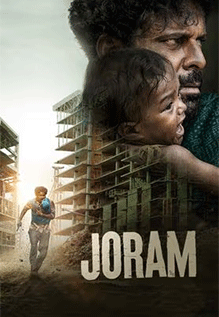
Review: Here’s a movie where you need just a few minutes of viewing to know that you’re in for an intriguing and intense watch along with a stellar performance by its lead, Manoj Bajpayee, who plays Dasru Karketta/Bala. The first instance he appears on the screen, squatting on the floor under the open sky, you are convinced he’s a tribal rooted in culture. He gets the look (with face tattoos) and the demeanour perfectly and has a tight grip on it until the end and through the different phases of his rich character arc.
The opening sequence sets the movie’s tone, with a tribal couple from Jhinpindi, Jharkhand, singing a folk song about nature as the wife sways on a rope swing. As the frame freezes, the swing and the couple have vanished. The unnerving stillness warns you of a storm about to unleash on the screen. Throughout the 121 minutes, the movie consistently builds intrigue, beginning with how the couple ended up in a cramped shanty in Mumbai five years later, or why Bala is unnerved when he comes face to face with MLA Phulo Karma (Smita Tambe D Dwivedi). The film unravels the mystery gradually while serving edge-of-the-seat drama, as Dasru is on the run trying to save himself and his baby, Joram. The chase sequence on a train when he tries to skip the city will totally draw your attention.
Writer-director Devashish Makhija excels in presenting a layered narrative — the super-tense survival scenes, the stark reality of the tribals and rebels, or the man versus nature conflict that’s destroying the ecology. It also depicts how the politicians and authorities are in cahoots with mining companies that relentlessly exploit the tribals. While some of these themes aren’t new, the storytelling is enticing, and although non-linear, the taut screenplay is not once confusing or fragmented. However, the initial thrill tapers off as the latter half of the film, the focus shifts to the socio-political side of the story.
Makhija handles the film’s political aspect well and refrains from overtly taking sides. While he shows how the tribals are being shortchanged and the environment is being destroyed in the name of development, he reveals another perspective, too. The MLA wants her community to enjoy every facility that urban people do, and one of the constables says that rebels and soldiers both wear uniforms for different reasons, but one cannot judge who’s right or wrong. The narrative also throws light on how those on the fence have it toiugh, too, as they are labelled ‘sympathisers’ of rebels or supporters of oppressors. Cinematographer Piyush Puty enhances the drama with his outstanding camerawork, whether depicting tribal life, a father on the run, cranes and diggers marauding nature, or what the verdant land will soon look like.
The film is also loaded with symbolism and meaning, whether Dasru ‘s wife Vaano (Tannishtha Chatterjee) swaying in the great wide open or the swing made of a saree inside the hut. While trying to escape Mumbai, an onlooker asks him, ‘Kuchh dhoondh rahe ho kya? (Are you looking for something?).’ When he reaches Jharkhand, a tribal asks, ‘Kisiko dhoondh rahe ho (Are you looking for someone?)?’ indicating Dasru is running but has nowhere to go. The dialogues are also heartrending.
Manoj Bajpayee is outstanding as the helpless and hapless father running from his dark past and bleak present. Scenes of him bonding with and caring for his baby will tug at your heartstrings. Smita Tambe Dwivedi steals the scene as the coldhearted MLA. She delivers a nuanced performance as an emotionally wounded but conversely unfeeling woman. Mohammed Zeeshan Ayyub is excellent, too, as a conflicted Sub-Inspector Ratnakar Bangul tasked to capture Dasru. Tannishtha Chatterjee plays her part well in the special appearance.
Joram is a gritty tale that will stay with you for a long time. Although it strays from being a survival drama as the socio-political facet overpowers the narrative, it’s a must-watch for its intense storytelling and performances. The poignant movie will also make you think about what we are doing to Mother Nature in the name of development and progress. It deserves to be watched on the big screen.